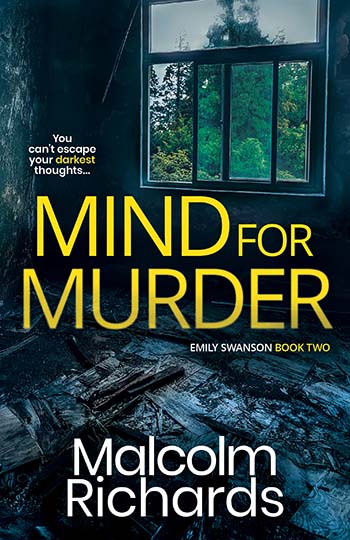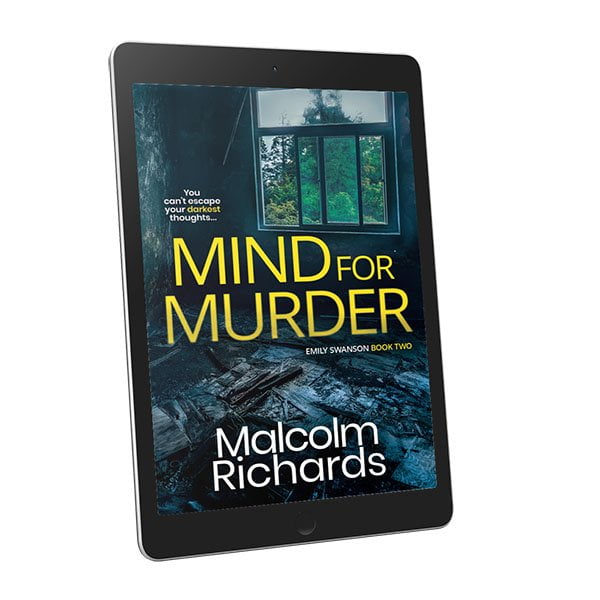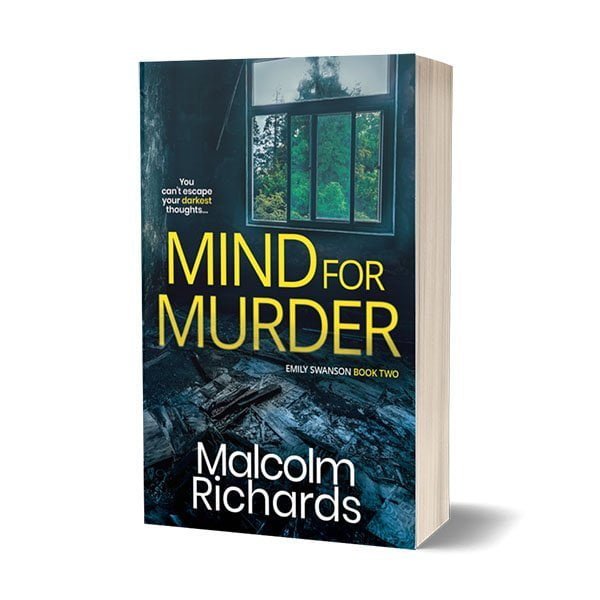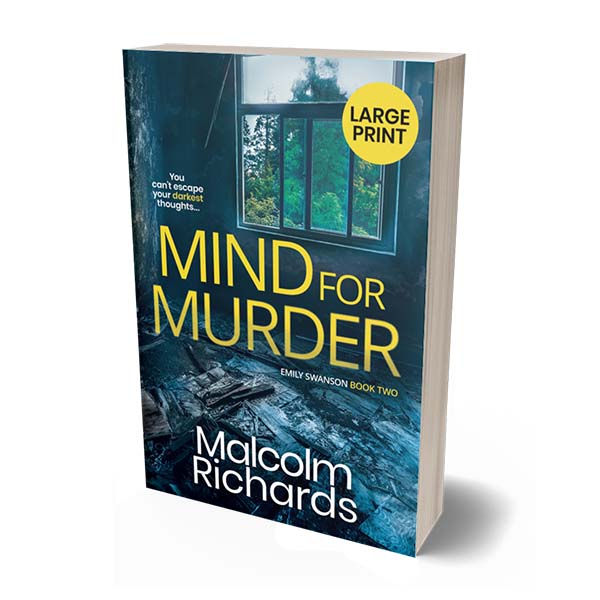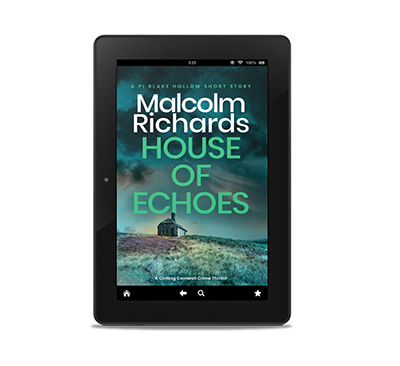PROLOGUE
He ran through the forest, stumbling blindly in the darkness. Rain lashed against his skin. Low hanging branches whistled past his eyes. He didn’t know where he was going. But they were coming for him. And if they found him, they would kill him.
Sounds filled his ears as he dashed forward. The machine gun rat-a-tat of rain on leaves; the howl of the wind whipping the trees into a frenzy; the crunch of foliage underfoot. He pushed on, lungs burning, pain throbbing where, just moments ago, fists and boots had pummelled his body.
He risked a glance over his shoulder. White lightning strobed through the canopy, quickly followed by a deafening crack of thunder. He turned back again, tripped over an exposed root and slammed into a tree. His body twisted and spun, hitting the ground hard and punching the air from his lungs. For a moment, he lay there, stunned and struggling for breath. Then, from somewhere behind, he heard the thud of footsteps running straight towards him.
Adrenaline fired through his limbs. Scrambling to his feet, he launched himself forward and got running again. More lightning ripped across the sky, briefly illuminating the forest as if it were daytime.
There was a clearing up ahead. Sitting in its centre was an old shack. He knew he shouldn’t go in there. He knew he should keep running. But now he was on the porch and trying the door. Now the pain from the beating he’d endured was consuming his whole body.
The door was unlocked. Shouldering it open, he ducked inside, closed the door again and pressed himself up against the wood. Thunder rolled overhead. Rain attacked the tin roof like a blacksmith hammering on molten metal. Another burst of lightning lit up the room. He was inside a tool shed crammed with shelves. Sharp blades and instruments hung from hooks on the wall.
His heart began to race out of control. A wave of dizziness swept over him. He dropped to his hands and knees, and white-hot fire shot through his broken fingers. He bit down hard on his lip, choking back nausea and a scream. He half crawled, half dragged himself across the dirty floor, until he reached the furthest corner and curled into a ball in the shadows.
He waited. Seconds slipped by, then a minute, his pulse beating in time with the rain. He was beginning to wonder if he was safe here. If they had given up trying to find him.
But he had already been found.
A shadow passed outside the window. The door handle turned and the door swung open, letting in the wind and rain.
The world fell away. He held his breath and tried to make himself small. Boots, heavy and deliberate, stomped across the floor.
He was trapped in the corner like hunted prey. He needed to fight back. To find a weapon and lash out. But his strength was gone. Darkness embraced his body like his mother’s arms, when he had once been small and infantile. When he had once been innocent.
Lightning lit up the room. A figure loomed over him, with a blade, curved and cruel-looking, raised up to the ceiling.
“Please,” he begged, lifting his shattered fingers in front of his face. “I didn’t mean to hurt anyone. It’s not my fault!”
The figure stood there, motionless, the blade wavering.
“Please! I’ll leave and never come back. You won’t ever see me again.”
For a second, he thought he was safe. That he would be spared.
Then the blade came down, cutting through the air and deep into his flesh. He screamed as it swung, again and again. Tearing. Slicing. Spilling blood as black as night. Until he was silent.
Until he was still. His final, ragged breath floating away on the cold night air.
He became one with darkness.
He became nothing.
CHAPTER ONE
Emily Swanson sat on the sofa with her knees pressed together and her arms folded across her stomach, staring at the empty cream walls. The room needed something more. More character. More things. Perhaps a framed painting or a decorative mirror, a potted plant or two in the window. She understood that the blandness was deliberate; nothing to look at meant little chance of distraction. But surely a splash of colour here or there wouldn’t hurt.
Attempting a discreet sigh, her gaze moved from the walls to the coffee table, then to the desk in the corner. It was a very tidy desk, she noted, its contents neatly stacked and its surface free of dust. Like the room, it was lacking something. A vase of flowers to brighten it up or an ornamental paperweight.
Movement flickered at the corner of Emily’s eye. She turned to stare at the woman who was sitting in the armchair by the window, warm sunlight spilling over her legs. Kirsten Dewar was mid-thirties and smartly dressed, with dark hair and olive skin that contrasted with Emily’s blonde ponytail and pale complexion. She had a pleasant face with keen eyes that smiled even when her lips didn’t; like now, as she sat with a notepad balanced on her knee and a pen poised over the paper.
This was their sixth meeting in as many weeks. Each session began the same way. After exchanging polite greetings, Kirsten would lead Emily into the room, pour them both a glass of water, and position herself in the armchair. Then she would sit in silence, waiting.
Even now, Emily found those first few minutes excruciating. What was she supposed to say? Was she meant to come with a prepared speech, or did she sit on the couch until her thoughts found their way from her mind to her mouth and spoke for themselves? In their first session together, Emily and Kirsten had sat through twelve minutes of silence, time slowing down with each passing second. Then Emily had embarrassed herself by crying.
The opening silence had thankfully grown shorter with each meeting. At some point soon, Emily assumed it might even vanish altogether. Now, as the fifth minute ticked by, she drew in a long, steady breath and tried to clear her mind of thoughts. Words began to appear, formulating a sentence.
“I slept a whole four hours last night,” she said. The knots in her shoulders instantly began to loosen. Her hands remained tucked beneath her thighs.
Kirsten smiled. “Well, that’s a lot better than three. Are you feeling better for it?”
“More like I’ve been hit by a truck. Which is definitely an improvement on being hit by a steamroller.”
Kirsten nodded, jotting on her notepad. “Still, it’s only been a week since you came off the sleeping pills.”
“Ten days to be exact.”
“You know if you’re not ready, there’s no written rule saying you have to stop taking them just yet.”
Emily heaved her shoulders. There was a water stain on the bottom left corner of the coffee table. It irritated her, and had done so since her first visit.
“Yes, but one less pill means I don’t rattle as much when I walk. Besides, I’ve started experimenting with valerian root. Next I’ll be taking up witchcraft and sorcery.”
Kirsten smiled. It was a kind smile, Emily thought. Genuine.
“And how is your sleep when you have it?”
“You mean, am I still having the same nightmare?”
“Are you?”
“A night wouldn’t be complete without it.”
In the dream, she was tied down to a steel gurney in a stark, white room, and surrounded by surgeons dressed in bloody gowns. Their dead blue eyes stared down at her over their face masks, while in their hands they carried an array of surgical instruments and syringes of neon blue liquid. As needles pricked her skin and scalpels flashed in the overhead light, the voice of her dead mother whispered in her ear. ‘Don’t worry. It will all be over soon. Then you’ll sleep forever.’
Kirsten leaned forward, her smile fading as she rested her pen on the notepad.
“What you went through was incredibly traumatic. Your mind needs time to process it all. Dreams can be an outlet, a way for your unconscious to make sense of it all. I know it may not seem much of a comfort, but it does offer an endgame.”
“But I know exactly what happened to me,” Emily replied. “I was abducted from my home, put into a coma for three months, then drugged and experimented upon by a maniac. I’d say I’ve processed it enough.”
Kirsten watched her for a moment. “What happened to you won’t just disappear overnight. If you break a leg, you can’t just get up and walk again. The bone needs time to heal. For that to happen, the leg needs support in the form of a cast and a pair of crutches. Why should your mind be any different?”
“Tell that to Doctor Chelmsford. He believed trauma could be wiped from the mind like dirt from a window. Sometimes I wonder if he was right—do we always need to remember all the bad things that happen to us?”
“Doctor Chelmsford’s rather archaic school of thought and deeply unethical means of experimentation are the reasons why he’ll be spending the rest of his life behind bars. Doesn’t that tell you something?”
“It tells me it’s all done with,” Emily said. “It’s over. Now all I want to do is get on with my life.”
“And there’s nothing wrong with that. Making plans for the future is part of the healing process.” Kirsten picked up her pen and scribbled notes onto her pad. “Tell me, what does getting on with your life look like?”
Emily glanced away, her gaze returning to the stain on the table. Two months had passed since her horrific ordeal at the hands of Doctor Chelmsford. How long would the nightmares last? How long before she could set foot in a hospital, or her GP’s office, or even here at the therapy centre, without breaking into a cold sweat?
What did getting on with her life really mean? It meant sleeping through a night unaided. It meant waking up each morning without screaming and having to remind herself that she was safe.
Kirsten was staring at her, waiting for a response.
“I want to have an ordinary day with no bad feelings,” Emily said. “I want people to stop asking me how I’m doing every two minutes, as if I’m made of glass and I’m about to break. The truth is I broke a long time ago. If I can be okay with that, why can’t everyone else?”
“People care about each other. It’s human nature. Don’t you think that’s a good thing? To have people in your life who are concerned about your welfare?”
Emily bit down on her lower lip and stared through the window at the bland view of rooftops. Sunlight glanced off the windowpanes, making her squint.
“The people in my old life turned against me,” she said.
Kirsten continued to scribble down notes, the scratch of pen on paper the only sound in the room.
“Are you worried that’s going to happen again with your new friends?”
“I worry about a lot of things, as you know.”
“What about the journalists? Are they still calling?”
“The story is old news for now. Chelmsford and the others are awaiting trial. I’m sure the press will come snooping again when that happens.” She paused, the muscles in her shoulders knitting together again. “Coming to London was supposed to be about wiping the mirror clean. I had this big idea about becoming a different person. A better person. Someone with confidence and courage. Someone who’s not afraid to speak her mind or to stand up for those who can’t stand up for themselves. But here I am, still worrying. Still afraid. Like nothing’s changed at all. If only my brain came with an off switch.”
Kirsten leaned forward. “Emily, you’ve been through so much this last year, long before what happened with the doctors. Losing your mother, then Phillip Gerard’s suicide—those two events alone are enough to send anyone over the edge. But you’re sitting here today as a survivor. You’re strong. Much stronger than you give yourself credit for.”
“I don’t feel strong.”
“How do you feel?”
“Guilty.”
“For being unable to save your mother? For being unable to prevent the suicide of a young boy who had been systematically abused by his father for most of his short life? Tell me, how do you stop cancer, Emily? How do you anticipate someone’s behaviour when they can’t even anticipate it themselves?”
Emily looked away, tears forming at the corners of her eyes. “I spent my whole life hiding in the shadows. My mother saw to that. I know she couldn’t help it. Even before the cancer killed her, she’d been unwell for years; never leaving the house, never letting me have friends, always worrying something bad would happen even on the brightest of days. She trapped me, just like she was trapped inside her own fear. Teaching set me free. It didn’t matter I was back in the town I grew up in; every day I got to explore a new world with those children. Even with Phillip . . .” She shook her head, setting a tear free. “I should have saved him. I was his teacher and he turned to me for help. Instead, I behaved like a monster.”
“He was taunting you. You were in a deep state of grief. You lost control just for a moment. Emily, we wouldn’t be human if we didn’t have moments when we’re not in control. Phillip Gerard was not in control.”
“Phillip Gerard was an eleven-year-old boy. I was an adult who should have known better.”
“Even though you’d just lost your mother after giving up months of your life to care for her?”
Silence filled the room. Emily avoided the therapist’s gaze and stared at the floor. A brightly coloured rug would surely light up the drabness of the carpet.
“Imagine you had a sister and she was sitting right next to you, right at this moment,” Kirsten said. “Imagine she’s a teacher, and she tells you that a boy in her class killed himself because she shouted at him. Does that sound palpable to you? Does shouting at someone drive them to take their own life? Or is there a more credible explanation? What would you say to your sister?”
Emily stared at the empty space beside her.
“I’d tell her we all make mistakes,” she said in a whisper.
“Yes, we do.” Kirsten picked up her pen again. “And we’re focusing so much on the loss of life that we’re forgetting something hugely important.”
Emily looked up. “What’s that?”
“That you saved lives.”
“Some, I suppose. But some were lost, too. Others, damaged beyond repair.”
“And you think that’s your fault?” Kirsten frowned. “You saved lives, Emily. You discovered corruption that was so horrendous the perpetrators almost killed you to prevent the truth from getting out. Yet you risked everything to tell the world. Now, justice will be served. The patients those doctors were experimenting on are alive today because you had the courage to intervene. You should be proud of what you’ve achieved. And you should place the blame firmly in the hands of the guilty.”
Emily felt a tingling in her chest. She squeezed her eyes shut, preventing more tears from escaping.
“I’m trying,” she said.
Kirsten smiled warmly. “You’ll get there. You will. It’s just a matter of time and learning to forgive yourself.”
Emily opened her eyes again. She returned the therapist’s smile. “In that case, it’s lucky I have all the time in the world.”
